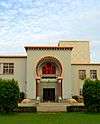Aligarh Movement
The Aligarh Movement was the push to establish a modern system of education for the Muslim population of British India, during the later decades of the 19th century.[1] The movement's name derives from the fact that its core and origins lay in the city of Aligarh in Northern India and, in particular, with the foundation of the Muhammadan Anglo-Oriental College in 1875.[2] The founder of the oriental college, and the other educational institutions that developed from it, was Sir Syed Ahmed Khan. He became the leading light of the wider Aligarh Movement.
The educational reform established a base, and an impetus, for the wider Movement: an Indian Muslim renaissance that had a profound implications for the religion, the politics, the culture and society of the Indian sub-continent.
One of indirect consequences of the awakening is the notion that without this revival of a Muslim self-consciousness and self-confidence, directly attributable to the movement, there could or would have been no Pakistan movement in the run up to Indian Independence.
Education
Aligarh Muslim University is the creation of the movement. The Aligarh Movement had a profound impact on the Indian society, particularly on the Muslim society compared to the other powerful but less adaptable movements of the 19th century. It influenced a number of other contemporary movements to a great extent that it caused the emergence of other socio-religious movements during the 19th century. The impact of Aligarh Movement was not confined to the Northern India only, but its expansion could be seen on the other regions of the Indian sub-continent during the 20th century.[3]
The Aligarh Movement has made a weighty and lasting contribution to the political emancipation of Indian Muslims.[4]
The Deoband school was opposed to the movement as Aligarh Movement.[5]
The Aligarh Movement introduced a new trend in Urdu literature. Sir Syed Ahmad Khan and his association left the old style of writing in the Urdu language, which was rhetorical and academic, and started a simple style which helped Muslims to understand the main purpose of the movement. Sir Syed Ahmed was the central figure behind this awakening.
References
- "Sir Syed Ahmed Khan and the Aligarh Movement". YourArticleLibrary.com: The Next Generation Library. Retrieved 3 April 2016.
- "Syed Ahmed Khan and Aligarh Movement". Jagranjosh.com. Retrieved 7 April 2016.
- "shodhganga.inflibnet.ac.in" (PDF). shodhganga. UGC.
- "ENLIGHTENMENT AND ISLAM: SAYYID AHMAD KHAN'S PLEA TO INDIAN MUSLIMS FOR REASON". ZMO. Archived from the original (PDF) on 24 October 2018.
- Dasgupta, Jyotirindra; Studies, University of California, Berkeley Center for South and Southeast Asia (1 January 1970). Language Conflict and National Development: Group Politics and National Language Policy in India. University of California Press. ISBN 9780520015906.
Further reading
- Ashirbadi Lal Srivastava, The Aligarh movement; its origin and development, 1858-1906 by Ema. Esa Jaina( Book )
- Ashirbadi Lal Srivastava, Study on the movement of Indian Muslim regeneration established at Aligarh, India

